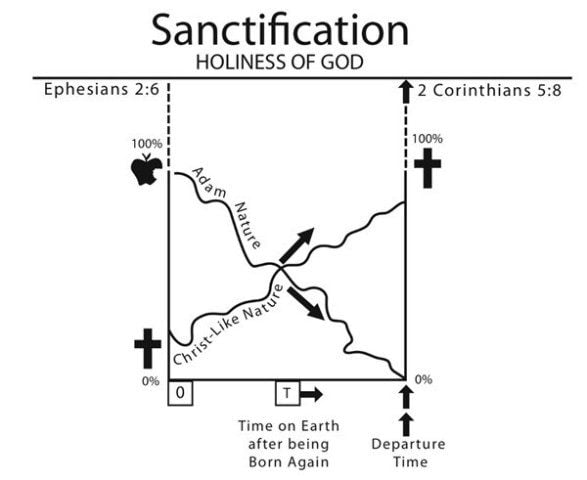
Progressive Sanctification
Ask the average Christian to explain the doctrine of sanctification and you will likely get a deer-in-the-headlights stare. At best, a good Baptist might be able to tell you that sanctification means being set apart — that a Christian has been set apart by God for service and worship. The average Christian has a hard-enough time explaining salvation, so they usually leave doctrines like sanctification, regeneration, justification, etc. to the experts. They know they’re saved and their ticket to Heaven has been punched. Now, what’s for dinner?
Every Christian sect would agree that all people are sanctified when God saves them. Baptists believe that after the initial act of sanctification, God, through the work of the Holy Spirit, progressively sanctifies saved people throughout their lives. In theory, the saved people should become more and more like Jesus the older they become. As God continues his sanctifying work, sins are revealed and the saved continually repent and seek forgiveness and mature spiritually. The sins that so easily swayed them when they were first saved are no longer an issue. They have “deeper” sins to deal with, the sins that no one but God knows about. Sanctification then, is a progressive work by God throughout the saved person’s life, a work that is designed to make them spiritually mature.
Nice theory, right? If progressive sanctification is how God sanctifies people, why are there so many people who have been Christians their entire lives who are still so sinful, carnal, and worldly? If one looks at the Baptist church, it would be easy to conclude that many Baptist congregants are actively resisting the sanctifying work of the Holy Spirit. No matter how often preachers threaten them with judgment and chastisement from God, they still continue to be infantile in their faith and worldly in their lifestyle.
Baptist preachers would likely say that their people are worldly and carnal because they are not listening to their preaching and applying it to their lives — missing the point that Baptist preachers are often just as worldly and carnal as the people they preach to/at. If the Holy Spirit actively, progressively sanctifies saved people, why do Baptist preachers spend so much time preaching on what I call the “first” works:
- Attending church regularly
- Tithing and giving offerings
- Praying
- Tithing and giving offerings
- Reading and studying the Bible on a daily basis
- Tithing and giving offerings
- Witnessing
- Tithing and giving offerings
It is not uncommon to find Baptist church members who have been saved for years still having problems doing these “first” works. In fact, only a very small percentage of the average Baptist congregation ever moves beyond these “first” works. Most church members go to the House of the Lord on Sunday, listen to the sermon, throw some cash in the offering plate, and go home — repeating the process again next week. They will “try” to read the Bible and pray during the week, but life often gets in the way, and before you know it, they need to go to Wednesday night prayer meeting — which is rarely a prayer meeting — to get their spiritual battery recharged. This is the typical life of a Baptist church member.
If the Holy Spirit lives inside of the Christian, why is the Christian able to easily thwart the Holy Spirit’s sanctifying work? Surely the Holy Spirit — who is God — should be able to lead/force/demand the Christian to progress in sanctification? Why is it that so many Christians stubbornly refuse to cooperate in the Holy Spirit’s sanctifying work?
Perhaps the real issue is that there is no Holy Spirit living inside of Christians and that Christians are human just like the rest of us unwashed, uncircumcised Philistines of the world. Christians behave like the humans they are. They work all day and come home tired. All they want to do is eat dinner and collapse in the recliner. Pray? Read and study the Bible? Yeah, they know they “need” to, but they are so damned tired that they don’t/can’t “commune” with God. The Holy Spirit has never been able to successfully overcome sleepiness. As we know from the Bible, the disciples fell asleep in the Garden of Gethsemane while Jesus was praying. If Peter, James, and John couldn’t stay awake, what hope is there for normal, run-of-the mill-Christians?
Perhaps the bigger problem is that preachers expect too much out of people. Preachers have the luxury of being paid for praying and reading the Bible. Preachers can schedule their lives in such a way that it makes it easy for them to pray, meditate, and study the Bible. That is, if they are not too busy playing golf or attending a pastors’ conferences. Towards the end of my ministerial career, I realized I was putting too much pressure on people to perform, to do the “first” works. I realized they had a life, and they had little time to devote to what I could spend hours and days doing. I quit nagging them, choosing instead to understand the machinations of their lives.
Entire Sanctification
Many Wesleyan, Holiness, and Pentecostal sects believe in entire sanctification. While they agree with the Baptist that every saved person is sanctified at the moment God saves them, they reject that post-salvation sanctifying life is progressive.
The proponents of entire sanctification believe in what is commonly called a second definite work of grace. Christians reach a certain place in their spiritual life where God does a mighty work in their lives and they are entirely sanctified. From this point forward, they no longer sin. Yes, that’s right, they no longer sin.
When people who have been entirely sanctified are confronted with behaviors that certainly “look” like sins, they will often say that their behaviors are mistakes, not sins. Entirely sanctified Christians think that they are so connected to God and his Spirit that perfect love flows in, through, and out of them, and they lose all desire to sin. Again, all one has to do to disprove this is to look at the lives of those who “say” they are entirely sanctified. Their lives betray the fact that indwelling, original sin remains. They may cover their sins with lofty, flowery religious garb, or redefine them as mistakes, but when the real person is exposed, that person is no different from the Baptists I mentioned above.
Years ago, I visited a Holiness church near the church I pastored in Somerset, Ohio. Holiness churches were quite common in the area, so I decided to attend a service to see for myself what they did. The church was holding a revival meeting, held by a Holiness pastor from another church.
Before the preacher started preaching, various church members stood up and gave testimonies. One lady was quite emotional, and as she wept, she told the congregation that at such and such a time she had finally gotten victory over sin and was entirely sanctified. The church voiced their approval. Another member had received the second blessing.
The evangelist began his sermon with an illustration. He told a story about buying a teapot. Inside the teapot was small tag that said: Wash twice before using. He thought this was a perfect illustration of entire sanctification. For a person to truly be used by God, they had to be washed twice, sanctified at the moment of salvation and entirely sanctified at a point later in life.
The evangelist’s wife stood off to the side as he preached. Every time he needed a verse from the Bible, he had his wife read it. It finally dawned on me halfway through his sermon that the evangelist couldn’t read. Lest you mock and ridicule such an uneducated man, many sects believe a lack of education is a plus. In their minds, it is better to be known as a man who has been with Jesus:
Now when they saw the boldness of Peter and John, and perceived that they were unlearned and ignorant men, they marvelled; and they took knowledge of them, that they had been with Jesus. (Acts 4;13)
An elderly man, who I assumed was a leader in the church, was quite vocal during the testimony time and the evangelist’s sermon on entire sanctification. At the close of the service, the evangelist had an altar call and a young man came forward to get saved. This church believed that a person had to keep praying — praying through — until God saved them. Numerous church members knelt around the young man encouraging him and helping him to pray through. The elderly man I mentioned? He went home. After watching the praying through spectacle for a few minutes, I decided to take my decidedly not-entirely-sanctified body home. I do not know if the young man successfully prayed though.
As I have mentioned before, I met secular university evangelist Jed Smock in the late 1980s. Jed was a big proponent of Charles Finney’s teaching of perfect love (entire sanctification). According to Jed, he and his wife Cindy hadn’t sinned in years. One could argue that Jed is deluded, since every time he opens his mouth to preach hate and judgment on a university campus, he sins. Jed is a hater, to be sure.
Jed was the first sinless Christian I met, but he wasn’t the last. In every instance, the sinless person called their “sins” mistakes. When they lost their temper it was a mistake, not a sin, even though the Bible calls anger a sin. I had one sinless man get so angry with me that he threw me out of his house. We were good friends and we had gotten into an argument about eternal security. He was an Arminian and I was a Calvinist. I thought we were going to get into a fistfight. At that moment, I was definitely not very sanctified and neither was my friend.
Conclusion
Sanctification allows Christians to hide their true nature. The believer in progressive sanctification says when they sin, “well God isn’t finished with me yet.” They see themselves as a work in progress. The believers in entire sanctification still sin like the Baptist does, they just find a way to explain away their sin. Both think that God, through the Holy Spirit, is working in, through, and out of them. Why then, do sanctified Christians behave, for the most part, just like everyone else? It’s not enough to aspire to spiritual greatness. Surely, if God lives inside a person, he should act and live like God would, right? Why is there such a disconnect with the doctrine professed and the life lived?
I think Greek dualism and Gnosticism have left a huge mark on American Christianity. As a result, many Christians have a warped view of their humanity, and this results in them living frustrated, contradictory lives. While all of us should desire to live a better life, we remain human, and as long as we are human, we will be prone to live like humans live. I have met a number of “sinless” Christians who were quite fat. Surely, an entirely sanctified person wouldn’t be overweight, especially since the Bible calls gluttony a sin.
I want to invite Christians back into the dirty water of humanity. We need you. We don’t need your sanctimony or your superior airs. We know who and what you are. You may be able to play the sanctified game while you are among your fellow Christians, but eventually, you must venture out into the world where the rest of us live. We see you at work, at the store, at the doctor’s office, and at the ballgame. We see your humanity and we smile. We know that you are just like the rest of us.
Bruce Gerencser, 68, lives in rural Northwest Ohio with his wife of 47 years. He and his wife have six grown children and sixteen grandchildren. Bruce pastored Evangelical churches for twenty-five years in Ohio, Texas, and Michigan. Bruce left the ministry in 2005, and in 2008 he left Christianity. Bruce is now a humanist and an atheist.
Your comments are welcome and appreciated. All first-time comments are moderated. Please read the commenting rules before commenting.
You can email Bruce via the Contact Form.


